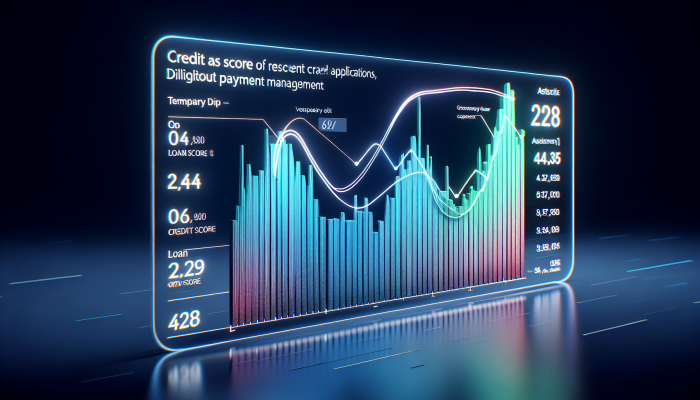Unlock the Power of Debt Consolidation to Elevate Your Credit Score: Key Insights Revealed
Engaging in debt consolidation is a strategic financial maneuver that can significantly enhance your overall financial health. It's imperative to grasp how debt consolidation affects your credit score to make empowered decisions that pave the way for a more stable financial future. By delving into the complexities of your credit score and the pivotal role of consolidation, you can navigate your financial journey with confidence and informed insight. This understanding allows you to tackle your current debt challenges while laying a solid foundation for sustained financial success in the long run.
Short-Term Credit Score Fluctuations During Debt Consolidation: What to Expect

As you embark on your debt consolidation journey, you may encounter a transient decline in your credit score. This initial decrease is often a result of hard inquiries made when applying for new credit accounts, such as a personal loan or a balance transfer credit card. Lenders perform these inquiries to evaluate your creditworthiness, leading to a slight score reduction with each inquiry. It's essential to recognize that while this drop may cause concern, it is usually a temporary setback rather than a permanent issue.
The initial dip in your credit score can induce anxiety, especially if you're already facing financial challenges. However, you can effectively mitigate this early decline by responsibly managing your consolidated debt and making timely payments. As you consistently fulfill your obligations on the new loan or credit card, the impact of the hard inquiry will diminish, allowing your score to gradually recover. This phase requires patience and a steadfast commitment to achieving your financial aspirations.
Maximizing Long-Term Benefits of Debt Consolidation for Improved Credit Utilization
One of the most significant long-term advantages of debt consolidation is its potential to reduce your credit utilization ratio. This critical metric assesses the relationship between your total credit card balances and your overall available credit, playing a vital role in determining your credit score. A lower credit utilization ratio conveys to lenders that you manage credit responsibly, which can greatly enhance your credit profile over time.
When you consolidate your debt, particularly by paying off high-interest credit cards, you can significantly reduce your outstanding balances. This reduction leads to a healthier credit utilization ratio, ideally keeping it below 30%. By maintaining a low utilization rate, you not only enhance your credit score but also position yourself as a lower-risk borrower in the eyes of financial institutions.
However, it is crucial to sustain this low utilization level after consolidation. If you start accumulating new debt on your credit cards post-consolidation, you jeopardize the positive impacts on your credit score. Therefore, a disciplined approach to managing your credit after consolidation is essential for achieving enduring success.
The Importance of Payment History in Achieving Debt Consolidation Success
Your payment history is the most critical factor influencing your credit score, accounting for roughly 35% of your FICO score. Therefore, utilizing debt consolidation to establish a manageable payment plan can greatly improve your credit profile. By consolidating your debts, you simplify your financial obligations into a single monthly payment, making it easier to stay organized and effectively manage your finances.
Consistently making on-time payments following consolidation will positively contribute to your credit score. Each punctual payment enhances your payment history, helping to offset any initial negative effects from hard inquiries. The longer you maintain a solid payment history, the more substantial its influence becomes in determining your overall credit score.
While this process may require discipline and perseverance, the ultimate reward is a healthier credit score and an improved financial standing. Therefore, it is beneficial to view debt consolidation as a strategic tool rather than a temporary fix, as it can yield remarkable long-term benefits.
Exploring Different Debt Consolidation Options and Their Impact on Credit Scores

Gaining a thorough understanding of the various debt consolidation methods is crucial, as each approach carries unique implications for your credit score. By examining these options, you can make informed decisions that align with your financial goals and individual circumstances.
Leveraging Personal Loans as an Effective Debt Consolidation Strategy
personal loans are a popular choice for debt consolidation, allowing you to combine multiple high-interest debts into a single loan with a fixed interest rate. This method can lead to varied effects on your credit score. When you apply for a personal loan, it results in a hard inquiry, which may cause a slight decrease in your score. However, as you begin to make consistent payments, the positive impact on your credit score can be substantial.
Moreover, personal loans typically offer lower interest rates compared to credit cards, allowing you to save on interest payments while effectively reducing your overall debt. As you work to pay down your consolidated debt, your credit utilization ratio improves, further enhancing your credit score.
It is vital, however, to avoid accumulating new debt while repaying your loan. This practice ensures that you maximize the benefits of debt consolidation while maintaining a healthy credit score.
Utilizing Balance Transfer Credit Cards for Strategic Debt Consolidation
Balance transfer credit cards offer an attractive solution for consolidating debt. These cards enable you to transfer high-interest credit card balances to a new card that offers a lower interest rate, often with an introductory 0% APR. This strategy can significantly reduce your interest payments but comes with certain credit score considerations.
When you apply for a balance transfer card, a hard inquiry occurs, which can temporarily affect your credit score. However, if you manage to pay off your transferred balance within the promotional period, you can achieve significant savings. Additionally, this approach can lower your credit utilization ratio, positively impacting your score, provided you maintain low balances on your other credit cards.
Conversely, if you fail to pay off the balance before the promotional period ends, the interest rate may increase dramatically, leading to higher payments that could strain your finances. Furthermore, maxing out your new balance transfer card could negatively impact your credit utilization ratio, resulting in adverse effects on your score.
Using Home Equity Loans for Strategic Debt Consolidation

Home equity loans provide another route for debt consolidation, enabling you to leverage the equity in your home as collateral to obtain a loan. This option can offer lower interest rates, which is beneficial for managing high-interest debts, but it also comes with specific risks and implications for your credit score.
While a home equity loan can help to lower your credit utilization ratio and enhance your score, the risk of losing your home in the event of default is considerable. Similar to other consolidation methods, applying for a home equity loan will lead to a hard inquiry, which temporarily reduces your credit score.
It’s essential to carefully evaluate your overall financial situation before pursuing this option. If you are confident in your ability to manage the payments and avoid accumulating additional debt, a home equity loan can be a valuable resource for consolidating debt while simultaneously improving your credit score.
Strategies to Minimize Negative Effects on Your Credit Score During Debt Consolidation
Implement the following strategies to ensure that your debt consolidation experience enhances rather than hinders your credit score. These practices will help you navigate the complexities of consolidation while safeguarding your financial health and future.
Selecting the Most Suitable Debt Consolidation Method for Your Financial Goals
Choosing the most appropriate debt consolidation method is vital for minimizing negative impacts on your credit score. Take the necessary time to thoroughly assess various methods, considering their advantages and disadvantages in relation to your specific financial circumstances.
For instance, a personal loan may be an ideal choice if you have a stable income and a solid credit profile, as it typically offers lower interest rates. Alternatively, a balance transfer credit card with a lower limit may be more beneficial if your credit is less than perfect.
Conduct comprehensive research on different lenders, scrutinize the fine print, and ensure that you fully grasp the terms and conditions associated with each option. This diligence will empower you to select a method that aligns with your financial objectives while minimizing any adverse effects on your credit score.
Maintaining a Low Credit Utilization Ratio After Consolidation
Once you've completed your debt consolidation, it is essential to maintain a low credit utilization ratio to protect your credit score. One effective strategy involves refraining from incurring new debt on your credit cards while you are repaying your consolidated loan. This practice helps to keep your credit utilization low, positively influencing your credit score.
Additionally, consider utilizing budgeting tools to monitor your spending habits and ensure that you are living within your means. By maintaining low credit card balances and making timely payments, you reinforce a positive credit history, which is highly valued by lenders.
Another practical approach is to request credit limit increases on your existing credit cards. This can enhance your total available credit, thereby lowering your credit utilization ratio, provided that you avoid increasing your spending.
Establishing a Strong Payment History to Enhance Your Credit Score
A robust payment history is crucial for boosting your credit score after debt consolidation. Throughout the debt consolidation process, commit to making consistent, on-time payments. This dedication will not only elevate your credit score but also instill a sense of financial discipline and responsibility.
Consider setting up automatic payments for your consolidated loan or credit card to ensure you never miss a due date. Regularly monitoring your accounts can provide additional peace of mind, allowing you to address any potential issues before they escalate.
Remember, a positive payment history signals to lenders that you are a responsible borrower. Over time, this can lead to increased creditworthiness and the potential for more favorable loan terms.
Real-Life Case Studies: Analyzing Debt Consolidation's Impact on Credit Scores
To fully grasp the implications of debt consolidation on credit scores, let’s delve into real-world scenarios and case studies. These examples will illustrate how individuals have navigated the complexities of consolidation and the resulting effects on their credit scores.
Case Study: Conquering High-Interest Credit Card Debt
Consider Jane, who was overwhelmed by high-interest credit card debt. With multiple cards maxed out and monthly payments spiraling out of control, Jane opted to pursue a personal loan for debt consolidation.
Initially, Jane's credit score experienced a decline due to the hard inquiry from her loan application. However, as she diligently made timely payments on her new loan, her credit score began to rebound. Within a year, her credit utilization ratio decreased significantly, resulting in a notable improvement in her credit score.
Through disciplined financial management, Jane successfully transformed her financial situation, leveraging debt consolidation to regain control over her credit.
Case Study: Simplifying Student Loan Payments for Better Management
A recent graduate, Mark, faced the daunting task of managing multiple student loans with varying interest rates. He chose student loan consolidation to streamline his payments and potentially lower his interest costs.
Initially, Mark experienced a slight dip in his credit score due to the hard inquiry associated with his consolidation efforts. However, his credit score gradually improved as he made consistent payments on the consolidated loan. Mark maintained a healthy credit utilization ratio by avoiding new debt, demonstrating the positive impact of consolidation on his credit profile.
This case exemplifies how strategic debt consolidation can yield favorable outcomes for credit scores, particularly for young borrowers.
Case Study: Effectively Managing Multiple Small Debts
Sarah had accumulated various small debts from personal loans and credit cards. She opted for a balance transfer credit card with an introductory 0% APR to consolidate these obligations.
While her credit score temporarily declined due to the hard inquiry, Sarah successfully paid off her transferred balance before the promotional period ended. As a result, her credit utilization ratio improved, and her credit score steadily increased.
Sarah’s experience highlights the importance of effectively managing consolidation methods and illustrates the significant potential for improved credit scores through disciplined financial behaviors.
Debunking Common Myths and Misunderstandings About Debt Consolidation and Credit Scores
As with any financial topic, numerous misconceptions surround debt consolidation and its effects on credit scores. Let’s clarify some of the most prevalent myths to gain a clearer understanding of this financial strategy.
Myth: Debt Consolidation Always Leads to a Lower Credit Score
A common belief is that debt consolidation inherently results in decreased credit scores. While it is true that hard inquiries can temporarily impact your score, debt consolidation can ultimately facilitate long-term improvements. By concentrating on responsible payment habits and lowering your credit utilization ratio, you can significantly enhance your credit profile.
Understanding this nuance is vital for making informed decisions regarding your debt management strategies.
Myth: All Debt Consolidation Methods Produce Similar Outcomes
Another misconception is that every debt consolidation method yields the same effects on your credit score. Different options—personal loans, balance transfers, and home equity loans—carry distinct implications for your credit profile.
Each method has its own advantages and disadvantages, making it essential to evaluate them based on your individual financial situation and objectives. A tailored approach to debt consolidation can maximize its benefits for your credit score.
Myth: Debt Consolidation Eliminates Your Debt History
Some individuals mistakenly believe that debt consolidation erases their debt history, offering a fresh start. In reality, consolidating your debts does not erase your previous payment history or existing balances; it merely combines them into a more manageable form.
Your credit report will still reflect your past debts, and responsible management of the consolidated debt is crucial for demonstrating your creditworthiness. Recognizing this fact can help you approach debt consolidation with realistic expectations.
Addressing Frequently Asked Questions About Debt Consolidation and Its Impact on Credit Scores
What Is the Timeline for Credit Score Recovery After Consolidation?
Your credit score can generally take several months to recover after debt consolidation. The recovery timeline varies based on your payment habits and overall credit utilization.
Can Debt Consolidation Improve My Chances of Securing Better Loan Rates?
Absolutely! Consolidating your debt can enhance your credit score, making you a more attractive borrower. This improvement may enable you to qualify for more favorable loan rates.
What Should I Do If My Credit Score Drops Following Consolidation?
If you notice a decline in your credit score after consolidation, focus on making timely payments and maintaining low credit utilization. Over time, these actions can help rebuild your score.
Is Debt Consolidation Suitable for Everyone?
Debt consolidation might not be the best approach for everyone. It’s crucial to evaluate your financial situation, including your debts, income, and spending habits, before determining if this method is suitable for you.
Can I Consolidate Both Student Loans and Credit Card Debt Simultaneously?
While it is possible to consolidate both student loans and credit card debts, they typically require different methods. To optimize potential benefits, consider specific options tailored to each type of debt.
Will Debt Consolidation Affect My Ability to Obtain New Credit?
Initially, debt consolidation may impact your ability to secure new credit due to hard inquiries. However, with responsible management of consolidated debt, your creditworthiness can improve over time.
Are There Any Fees Linked to Debt Consolidation?
Some debt consolidation methods may incur fees, such as balance transfer or loan origination fees. It’s important to be aware of these costs before proceeding with consolidation.
How Can I Identify a Reliable Debt Consolidation Service?
Research and compare various debt consolidation services, focusing on reviews and ratings from reputable sources. Ensure the service is transparent about fees and provides a realistic plan for managing your debts.
Can I Consolidate Debts Without a Strong Credit Score?
While a solid credit score facilitates consolidation, options exist for those with poor credit. Consider secured loans or collaborating with credit counselors to develop personalized strategies.
Can Debt Consolidation Function as a Long-Term Solution?
Debt consolidation can be a part of a long-term financial strategy, but it necessitates ongoing discipline and responsible financial management. Use it as a stepping stone toward a healthier financial future.
Connect with Us on Facebook
This Article Was First Found On: https://www.debtconsolidationloans.co.uk
The Article Debt Consolidation’s Impact on Your Credit Score Was Found On https://limitsofstrategy.com
The Article Debt Consolidation Effects on Your Credit Rating First Appeared ON
: https://ad4sc.com


It’s fascinating how debt consolidation can serve as both a remedy for immediate financial strain and a stepping stone toward better credit health. I remember when I first faced overwhelming debt; the thought of consolidating felt daunting. However, I realized that understanding the mechanics behind my credit score gave me clarity and empowerment.
It’s great to hear about your journey through the world of debt! It’s definitely a landscape that can feel overwhelming at first. I think a lot of people underestimate just how powerful understanding your credit score can be in demystifying the whole process.
“I’m glad to hear that you found clarity in understanding your credit score! If you’re looking to explore how debt consolidation can work for you, check out this helpful resource.”
https://notpotatoes.com/octopus